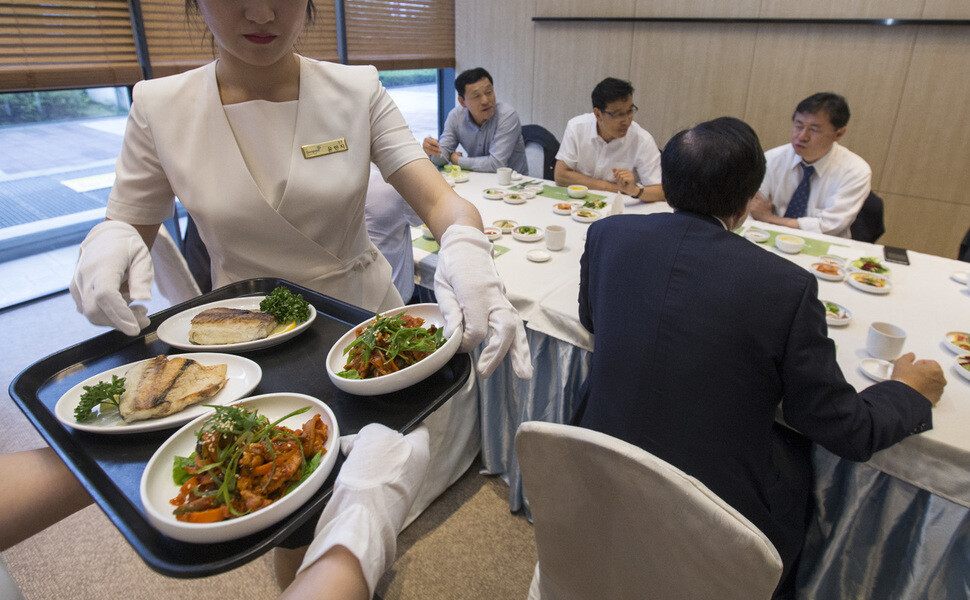hankyoreh
Links to other country sites 다른 나라 사이트 링크
New anti-corruption act directly affects 4 million, but changes life for all S. Koreans

The Anti-Corruption and Bribery Prohibition Act (or the Kim Young-ran Act, as it is more commonly known), which goes into effect in South Korea on Sep. 28, is expected to bring sweeping changes to the culture of providing entertainment and favor-seeking that is endemic in the country.
While it is estimated that only about 4 million people will be directly affected by the Kim Young-ran Act - including public servants, teachers and journalists, along with their spouses - these people work at schools, local government offices and hospitals, or in other words at places that play an integral role in South Koreans’ daily lives. Indeed, it is no exaggeration to say that this Act will transform the lives of all 50 million people who live in South Korea.
“Whenever I used to have a parent-teacher conference, I always felt pressure to buy something for the teacher. But now I can’t even buy the teacher a bottled drink. I’m glad I don’t need to worry about that anymore,” said Kim Sun-mi, 48, who has one child in elementary school and one in high school.
The Kim Young-ran Act bans parents from even buying a cup of coffee for their children’s homeroom teacher. This relationship falls outside of the Kim Young-ran Act Enforcement Decree’s so-called “3-5-10 Regulation,” which states that up to 30,000 won can be spent on meals, up to 50,000 won on presents and up to 100,000 won on weddings, funerals and other family events to maintain social relationships and a harmonious working environment.
“Parents are directly involved with students’ grades and evaluations and the other work that teachers do. Unless there are some unusual circumstances, you can’t regard the presents a parent gives to a teacher as being a social interaction. Thus, not even small presents are permitted,” said an official from the Anti-Corruption and Civil Rights Commission, the government agency responsible for the Kim Young-ran Act.
In interaction not only with teachers but with all public servants - including central government officials, local government officials, judges, prosecutors and police - there are two key rules that must be obeyed. First, inappropriate requests may not be made in 14 situations, which include issuing licenses or permits, making appointments, giving grades and conducting investigations and trials. For example, asking a teacher to give some special attention to the remarks section on a child’s school transcript would count as an inappropriate request even if no cash or goods are exchanged.
Second, public servants may not be given cash, meals, presents or any other cash or goods. Importantly, the 3-5-10 Regulation does not apply to teachers or police officers. When either of these two rules are broken, not only the public servants who received the request or the cash and goods but also the person who made the request or gave the cash and goods are subject to prosecution.
Furthermore, patients at the hospital cannot ask the hospital staff to push forward their outpatient treatment, hospitalization or surgery. Medical staff at national hospitals, at hospitals set up by local governments and at university hospitals are all subject to the Kim Young-ran Act. When patients or their guardians give presents to hospital staff as a token of their gratitude, these must also adhere to the standards of the Kim Young-ran Act.
At some universities, it has been customary for graduate students to treat their advisor to a nice meal and even to pay some money to cover “traffic expenses” after the advisor reviews their dissertation, but this is also no longer permitted.
Sep. 28, 2016, is the day when South Korean society starts getting rid of corruption and undesirable customs.

By Kim Kyung-wook, staff reporter
Please direct questions or comments to [english@hani.co.kr]

Editorial・opinion
![[Column] Season 2 of special prosecutor probe may be coming to Korea soon [Column] Season 2 of special prosecutor probe may be coming to Korea soon](https://flexible.img.hani.co.kr/flexible/normal/500/300/imgdb/original/2024/0426/3317141030699447.jpg) [Column] Season 2 of special prosecutor probe may be coming to Korea soon
[Column] Season 2 of special prosecutor probe may be coming to Korea soon![[Column] Park Geun-hye déjà vu in Yoon Suk-yeol [Column] Park Geun-hye déjà vu in Yoon Suk-yeol](https://flexible.img.hani.co.kr/flexible/normal/500/300/imgdb/original/2024/0424/651713945113788.jpg) [Column] Park Geun-hye déjà vu in Yoon Suk-yeol
[Column] Park Geun-hye déjà vu in Yoon Suk-yeol- [Editorial] New weight of N. Korea’s nuclear threats makes dialogue all the more urgent
- [Guest essay] The real reason Korea’s new right wants to dub Rhee a founding father
- [Column] ‘Choson’: Is it time we start referring to N. Korea in its own terms?
- [Editorial] Japan’s rewriting of history with Korea has gone too far
- [Column] The president’s questionable capacity for dialogue
- [Column] Are chaebol firms just pizza pies for families to divvy up as they please?
- [Column] Has Korea, too, crossed the Rubicon on China?
- [Correspondent’s column] In Japan’s alliance with US, echoes of its past alliances with UK
Most viewed articles
- 1[Column] Season 2 of special prosecutor probe may be coming to Korea soon
- 2‘We must say no’: Seoul defense chief on Korean, USFK involvement in hypothetical Taiwan crisis
- 3Is N. Korea threatening to test nukes in response to possible new US-led sanctions body?
- 4No good, very bad game for Korea puts it out of Olympics for first time since 1988
- 5Is Japan about to snatch control of Line messenger from Korea’s Naver?
- 6Division commander ordered troops to enter raging flood waters before Marine died, survivor says
- 7Korea’s 1.3% growth in Q1 signals ‘textbook’ return to growth, says government
- 8N. Korean delegation’s trip to Iran shows how Pyongyang is leveraging ties with Moscow
- 9[Editorial] Korea’s surprise Q1 growth requires objective assessment, not blind fanfare
- 10[Editorial] Government needs to stop impeding Sewol mourning